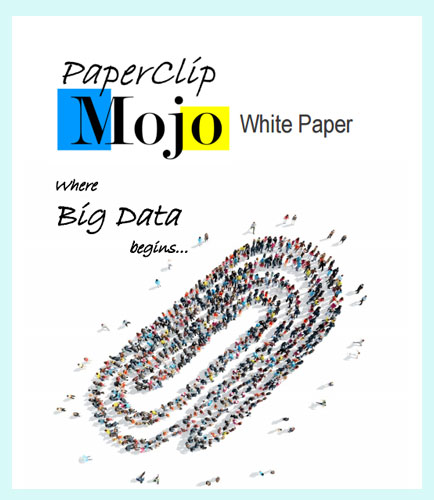
PROCESSING. PLEASE WAIT...



White Paper: PaperClip Inc.
Everybody talks about big data with many uses starting with predictive analytics of this big data. Today’s challenge is the way in which we approach data standardization and how to manage data and engage Crowd Sourcing for Big Data processing.
It is very important to find a way to standardize the data, one integration point to exchange with trading partners and open up collaborations with different industries to begin building a true Big Data platform.
Leveraging the best use of technology interacting with people can provide an economical service of data capture, data warehousing and predictive analytics.
This whitepaper provides insights on the ways to transcribe, translate and interpretation of Big Data faster and more accurate than ever.
Shredded Data Technology
Complete Application Data Capture enabling Big Data processing
Timely, Accurate and Secure Data
Standards Based Data Dictionary
Clippers Processing Forms
Combination of Crowd Sourcing and Imaging Technology
By: Signavio
An enterprise-wide process modeling is the most agile way to conduct a successful digital transformation as it requires a top-down examination of the performance, quality and sustainability. Digital transformation is an essential step in the evolution of many businesses today. Process modeling has grown from creating a diagram or report figure that explains a business problem to a transformational practice that can organize the way a business is monitored, controlled, and measured. This whitepaper discusses why businesses should consider an enterprise-wide process modeling approach for competing through digital transformation. Key takeaways of this white paper: Take Process Models out of isolation within your business Nurturing digital business transformation by focusing on your process From business process mapping to enterprise business process modeling Ways to instigate enterprise-wide process modeling
By: CoreOS
Kubernetes is Google’s third container management system that helps manage distributed, containerized applications at massive scale. Kubernetes automates container configuration, simplifying scaling, and managing resource allocation. It comprises a rich set of complex features, and understanding this new platform is critical to the future of your organization. Kubernetes also manages their lifecycles, and maintains and tracks resource allocation in a cluster of servers. This whitepaper provides insights on how to address these challenges, as many organizations are now turning to Kubernetes to help orchestrate and manage their containers in production, development and test environments. Inside this Kubernetes White Paper: Kubernetes as container orchestration Basic Kubernetes architecture The benefits of Kubernetes What to consider when deploying Kubernetes


 2026 All Rights Reserved | by: www.ciowhitepapersreview.com
2026 All Rights Reserved | by: www.ciowhitepapersreview.com